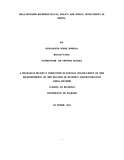| dc.contributor.author | Njenga, Elizabeth N | |
| dc.date.accessioned | 2013-03-01T12:44:40Z | |
| dc.date.issued | 2012-10 | |
| dc.identifier.citation | MBA Thesis 2012 | en |
| dc.identifier.uri | http://erepository.uonbi.ac.ke:8080/xmlui/handle/123456789/13072 | |
| dc.description | Master Thesis | en |
| dc.description.abstract | The share of public investment in GDP, and especially the share of infrastructure
investment, has declined during the last three decades in a number of countries,
particularly in developing countries. Fiscal impact of public investment has to be
determined. The size and composition of an annual investment program should be chosen
taking into account its short- and longer-term impact on government finance. The
constraints in Kenya’s public investment program are reflected in the state of
infrastructure. Kenya’s strong economic performance between 2002 and 2007 has been
partly attributed to macroeconomic stability and strong fiscal consolidation. This study
sought to establish the relationship between fiscal policy and public investment in Kenya.
This study used a descriptive survey. Population of this study was data obtained from the
Kenya national bureau of statistics and Annual Economic Survey. The study used
secondary data sources in gathering data for analysis. Descriptive statistics such as
means, standard deviation were used to analyze the data. Data presentation was done by
the use of frequency tables for easy of understanding and interpretation. Inferential
statistic such as regression and correlation analysis was carried out to establish the extent
to which fiscal policy influence public investments. The study found that fiscal policies
such as introduction of taxes by the government would influence the growth of public
investments. The results indicated that Government recurrent expenditure was
significantly associated with fiscal policy introduced in the economy, while Government
Capital Expenditure was significantly associated with the degree of fiscal policy applied.
The study concluded that there exist positive change in Government Capital Expenditure
would lead to an increase in public investments. The study concluded that low-income
countries such as Kenya fiscal policies may not be harmful for either long- or short-term
growth. | en |
| dc.description.sponsorship | University of Nairobi | en |
| dc.language.iso | en | en |
| dc.title | Relationship between fiscal Policy and Public Investment in Kenya | en |
| dc.type | Thesis | en |
| local.publisher | School of Business, University of Nairobi | en |

